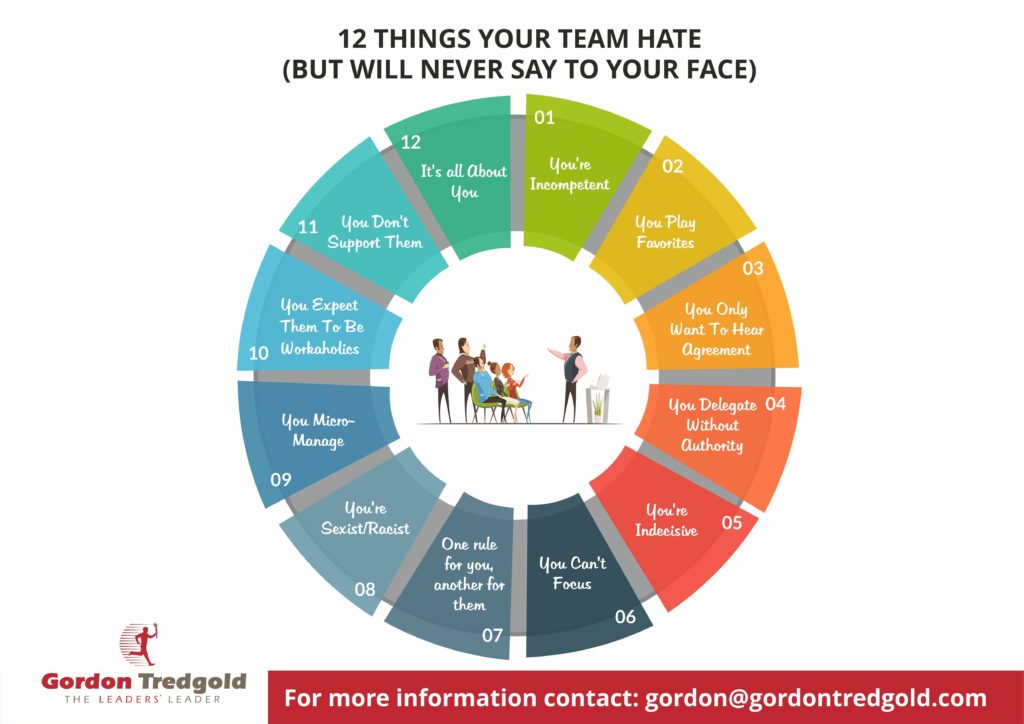12 Things Your Team Hate About You (But Would Never Say To Your Face)
- 6 Min Read
50% of people who quit their jobs do so because of their direct boss. Gordon Tredgold, Global Gurus Top 30 Leadership Expert, Speaker, and Business Consultant, tells People Leaders the real reasons their teams leave them behind.
- Author: Gordon Tredgold
- Date published: Dec 9, 2019
- Categories

We all like to think that we are a great boss and that our teams love to work with us. We might even point to the fact that our teams never complain as proof positive about the quality of our great leadership.
However, a quick study of the facts will show you that, on average, 50% of people who quit their jobs do so because of their direct boss. That means, if anyone left your team in the past year, then there is a 50/50 chance it was because of you!
But that can’t be true. I hear you cry because they never said anything to me.
In reality, they rarely do. Here are fifteen things your team may hate about you, but would never say to your face.
You’re Incompetent
We have all worked for at least one boss where we wonder how the hell did they get this job. As they don’t the technical skill or the leadership know-how to lead a team that is technically competent.
This hatred ramps up even higher when the boss demands to be involved in all aspects, all technical decision making, even though they lack the knowledge needed to add any value.
I have even seen this get so bad that initiates fail, and that is never popular.
You Play Favorites
Just because you think Steve is a great guy, or that Mary is a great gal, doesn’t mean that everything they do is the greatest and that they deserve to get all the best opportunities.
There are very few things that cause dysfunction within a team quicker than the boss playing favorites. Not only does this lead to the team hating you, but they will also hate those that you favor.
Share the love and opportunities.
You Only Want To Hear Agreement
It’s great that you are a boss that listens. But it’s a huge shame that you only want to hear positive things and agreements on your ideas and suggestions.
Studies have shown that for projects fail, 70% of the time that the teams involved knew day one that the project would fail.
By refusing to listen to honest opinions, or encouraging open feedback, you can be dooming your teams to a failure that they can see coming, and why would they want to be involved in that.
You Delegate Without Authority
Delegating is great. But when you do it without delegating the necessary authority is a clear sign of a control freak. You want them to do the job, but you still want them to come back and agree on everything with you. This stops people from taking ownership and feeling empowered, which are good things. Instead it makes them feel like nothing more than an operative with little or no influence over outcomes.
You’re Indecisive
People want to receive clear direction. They want to know exactly what needs to be done and by when. You can’t lead effectively if you don’t know in which direction you’re going.
Indecision impacts people’s confidence both in the leader and the probable success of the initiatives being undertaken, and no one wants to be on a losing team.
You Can’t Focus
One of the few things worse than indecision is a lack of focus when you’re continually changing of priorities. It can leave your teams confused as to what’s important.
Make a decision, and stick to it until the task is completed.
It’s One Rule For Them, Another One For You
There are perks that come with being a manager, everyone understands that, and it’s why a lot of people want to become managers. But it’s when those perks extend beyond the standard benefits that people start to take a dislike.
At one company I worked, our boss forbids us to call him on weekends, or after 7 pm as this was family time. Yet he had no qualms about calling us when we were on vacation, or on weekends when he needed us. And don’t get me started about leaving early on Fridays…
You’re A Sexist
Yes, this is still an issue. We’d like to think we have overcome this, but it’s just not true. Bosses need to set the tone for this, but too often, I see and hear from people that the way they treat women is still unacceptable. When I ask them why they don’t say anything, they just say that’ HR’s job. If you don’t condemn nit, then you’re condoning it and people see that as being just as sexist.
You Micro-Manage
Everyone hates a micro-manager because no one wants to have someone stood on their shoulder all the time asking are we finished yet, are we finished yet.
Give people the chance to be successful without deriving them nuts chasing up every two minutes.
You Expect Them To Be Workaholics
You talk about the importance of work-life balance yet set deadlines that demand weekend and late-night working.
You schedule initiatives that run over the holidays, and you give them multiple priorities that you know they cannot meet in regular working hours.
There has to be some give-and-take but when it becomes all take; that’s when the relationship starts to deteriorate.
You Don’t Support Them
The one thing that people expect from their boss is support. A helping hand when the going gets tough, a word of encouragement to keep them motivated, and you defending them when things don’t go quite as planned or people start to criticize them unfairly.
One boss I worked for, never supported any of his team and then when he needed them, they were nowhere to be seen. It was funny that this came as a big shock to him.
It’s All About You
Everyone who comes to work wants to feel like they did a good job, and one of the ways they get that feeling is from the recognition and credit they get for the results that they achieve. As a boss, if you take all the credit, then you rob them of this feeling and make work become a chore.
Just because your teams never say anything, or complain about the way we lead them, doesn’t mean that they are happy with your management style. It just means that they are looking for another job and the first hint that you will get is when they hand in their notice.
Although I expect that many of those who fall into that category will never question the true reason as to why they left, they will just accept the “it’s a better opportunity,” or the “I’m leaving for more money” excuse that they are given.
Look at your management style and look to see how many of these could apply to you, and if you want to retain your staff, then look to make some changes now.
Oh yes, and an apology is always a good start.










